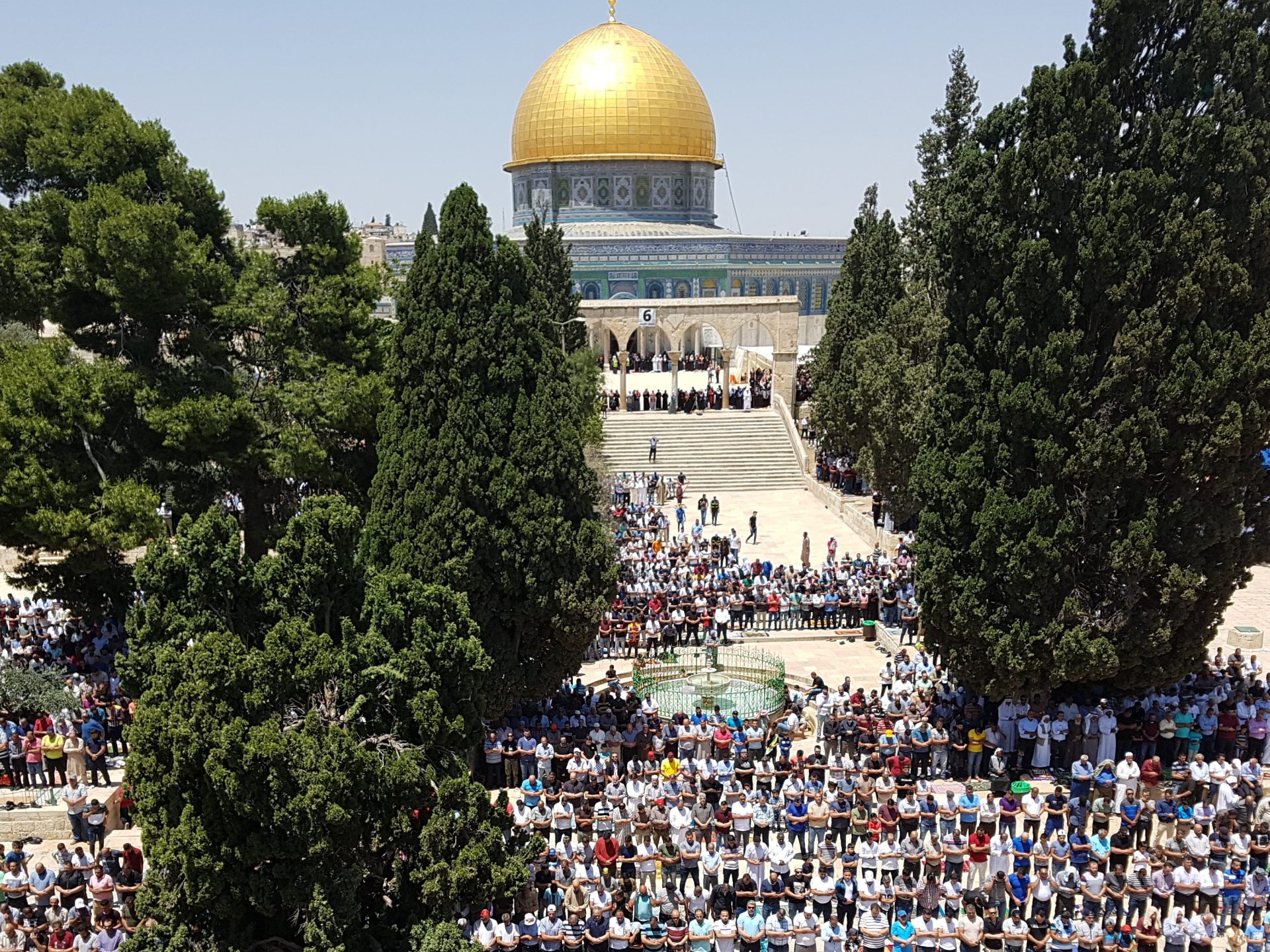GAZA — Firas Dahliz, a 34-year-old Palestinian, has to register in accordance with Israeli conditions for praying at Al-Aqsa Mosque after Israel limited the possibility of visiting residents of the Gaza Strip to Jerusalem, provided that the registrant is over 50 years old for women and 55 for men.
Dahliz's joy at the possibility of visiting Al-Aqsa was not complete, and turned into disappointment after learning of the details of the Israeli decision, as the talk is only about allowing 800 people out of the more than two million residents of the Gaza Strip to reach Jerusalem throughout the month of Ramadan, provided that they are elderly.
When the young Palestinian learned of the decision to open registration to visit Al-Aqsa and pray there, he tried to register with his mother, but was surprised that the conditions did not apply to them because they were too young to be old.
Dahliz, 21, says he has never visited Jerusalem in his life, adding, "In my family of about 100 people, there are only two or three people who have been able to pray at Al-Aqsa, and often they have only been able to pray there once or twice in their entire lives."
Praying at Al-Aqsa Mosque is a dream that millions of Muslims aspire to (Al-Jazeera)
Registration closes
Registration for visits to Jerusalem closed just a day after it opened, and the General Authority for Civil Affairs (affiliated with the government in Ramallah, the contact with Israel) justified the decision in a statement last Wednesday by "increasing the number of registered prayers to tens of times the required number."
Local Palestinian media, citing government sources, said the number of registered people in one day reached about 10,800, while only <> were available.
Since the outbreak of the first Palestinian intifada in December 1987, Israel has restricted access to Jerusalem for Gazans, which were reinforced after the outbreak of the second Palestinian intifada in 2000.
The restrictions of the occupation have Israeli judicial support, as the Supreme Court on August 2012, <>, refused to examine applications for Muslim Gaza residents to enter Jerusalem for prayers.
At the time, the Israeli rights group Gisha-Maslak, which defends the right to movement, and six Muslim women from Gaza petitioned the court to allow them to pray at Al-Aqsa Mosque during the holidays.
In November 2012, the Palestinian Center for Human Rights (PCHR) filed a complaint with the UN special rapporteur on freedom of religion or belief, stating that "the Israeli occupation practices a racist policy that prevents Muslims in the Gaza Strip from exercising their right to freedom of worship by visiting Al-Aqsa Mosque."
Following the Palestinian Nakba in 1948, the movement of Palestinians in freedom of worship was restricted to access to the Al-Aqsa Mosque, and matters worsened after the Israeli occupation of the West Bank and Gaza Strip in 1967.
Beautiful days
Widad al-Kishawi, an 83-year-old Palestinian woman, recalls the "beautiful days" she spent on frequent visits to Al-Aqsa Mosque.
Al-Kishawi, who currently lives in the Beach refugee camp west of Gaza City, told Al Jazeera Net that Palestinian Muslims from all cities and villages were keen during the month of Ramadan to pray and retreat in Al-Aqsa Mosque.
"In the days of the country, before the Nakba, my father used to take my grandmother from (the village) of Qubayba (Ramla district) on the orphan Friday (the last Friday in Ramadan) and pray at Al-Aqsa, because it is a holy place to which souls fall and where you feel very beautiful feelings that cannot be felt elsewhere, reverence. Reflections. spirituality."
Al-Kishawi pointed out that the Israeli occupation has been denying her access to Al-Aqsa Mosque for many years to pray there.
Wassim Skaik, who has been able to visit Al-Aqsa once, feels "lucky" to have been able to enter and pray there, at which time the 44-year-old did not receive an Israeli permit, but he sneaked into the mosque when he visited the West Bank in 1999.
Skaik says to Al Jazeera Net "I got a permit to visit the West Bank, and Jerusalem isolated from them, and infiltrated from the city of Bethlehem to Jerusalem, and I prayed at Al-Aqsa, and this was in the month of Ramadan, and then withdrew quickly for fear of arrest, then I felt that I snatched my right to visit the mosque against Israel."
He notes that for the past 23 years, his parents have not been able to visit Jerusalem, and his eight siblings have never visited Al-Aqsa Mosque or Jerusalem.
Breach of international law
Fadel Almuzaini, director of the Economic and Social Rights Unit at the Palestinian Centre for Human Rights, said the recent Israeli decision to allow only about 800 elderly people to visit Al-Aqsa represents a continuation of depriving Gazans of access to places of worship.
Almuzaini adds to Al Jazeera Net that "allowing small numbers of worshipers from Gaza to reach Jerusalem is a falsification of reality and an attempt to deceive the international community."
In return, Israel allows Jews to storm the Al-Aqsa Mosque, he said, adding that "freedom of worship is a right guaranteed by international human rights law, and should be available to all individuals and not to a specific number."
"The international community remains lenient with Israel, and the lack of accountability for violations and impunity encourage it to persist in its violations," Almuzaini said, explaining that international law and the Fourth Geneva Convention prohibit the prohibition of access to places of worship and consider it a crime to limit the freedom of movement of individuals.

